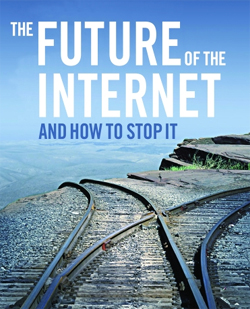Interview: Jonathan Zittrain, The Future of the Internet and How to Stop It
 Jonathan Zittrain had been serving as Oxford University’s Professor of Internet Governance and Regulation, until this week, when he agreed to return to Harvard Law as its newest tenured Professor. A ’95 grad of Harvard Law, Zittrain co-founded Harvard’s Berkman Center for Internet and Society, which makes him a key thinker about the kinds of topics I write about here.
Jonathan Zittrain had been serving as Oxford University’s Professor of Internet Governance and Regulation, until this week, when he agreed to return to Harvard Law as its newest tenured Professor. A ’95 grad of Harvard Law, Zittrain co-founded Harvard’s Berkman Center for Internet and Society, which makes him a key thinker about the kinds of topics I write about here.
He recently provided a brilliant hour-long interview about his book, The Future of the Internet and How to Stop It, which is now available for free download or listening as a podcast.
The interview with Jonathan Zittrain was aired on KZSU-FM, Stanford University Radio’s Hearsay Culture Show. It gives a conceptually tight history of how practical engineering forces influenced Internet architecture, and created a flexible, minimally managed network, which quickly outgrew the likes of Compuserve, Prodigy and AOL which were more focused, funded and accountable — but were less open to change and innovation.
He also uses the evolution of the computers from the Apple II, a full programmable machine, into today’s IPod, which from a programming perspective is a walled-garden. And with this theme of centralization vs. flexibility he then provides examples of how this choice in architecture plays out in terms of privacy, free access to information, and how flexibility for adaptation can allow greater generativity, and use to evolve in unforeseen ways.
His discussion concludes with a set of positive steps that individuals and innovative groups can take to use crowdsourcing to create a kind of heard consciousness to identify threats to Internet freedom. Zittrain has used this approach to build tools and programs, such as Stop Badware and the OpenNet Initiative, to leverage user information to help protect user freedoms.
If you are interested in the ideas discussed in UsefulArts, then you probably already enjoy Zittrain’s writing, and I’m glad to point out his interview. And as a Bostonian, I’m glad to see his intellect and energy increasing the the intellectual capital focused on these issues in our area. His return to HLS is good news.

 The future of digital experiences will be built by strategists who grasp the full array of emerging business, social, and technical models. Specialties in user experience, branding, application design, and data science are laying the foundation for richer user experiences and business models breakthrough products and revenue based marketing.
The future of digital experiences will be built by strategists who grasp the full array of emerging business, social, and technical models. Specialties in user experience, branding, application design, and data science are laying the foundation for richer user experiences and business models breakthrough products and revenue based marketing.